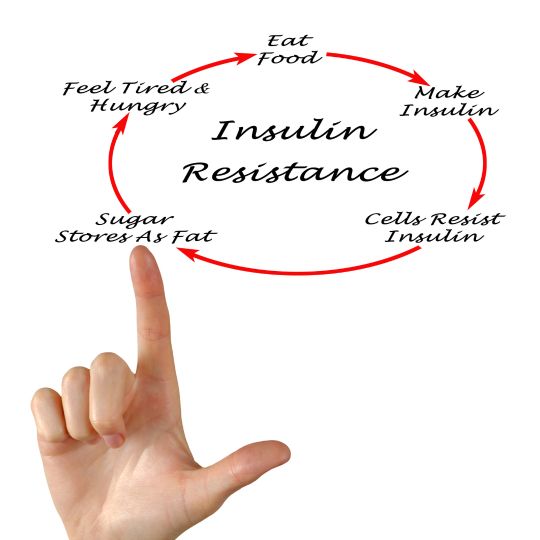One in three Americans—including half of those age 60 and older — have a silent blood sugar problem known as insulin resistance.
Do you suffer with any of the following?
Unexplained weight gain: Gaining weight too easily, and finding the fat is being stored around your abdomen
Hunger: increased hunger, including feeling ravenous, at times, and feeling hungry even after a meal
Cravings: cravings for sugar and carbohydrates (as they turn into sugar)
High blood sugar (high blood glucose) and also episodes of low blood sugar
Low energy: fatigue (feeling more tired than usual), and especially fatigue or sleepiness after meals
Cognitive issues: mood swings, brain fogginess and inability to focus
Digestive issues: tension in the abdomen, bloating, indigestion, bowel problems
High triglycerides
High LDL “bad” cholesterol
Low HDL “good” cholesterol.
If you have any one of these conditions, and you probably have more than one, then you likely have Insulin Resistance.
What is Insulin Resistance?
Insulin Resistance is a metabolic disorder – your metabolism is not working as it should. Metabolism describes the chemical reactions in the body’s cells that change food into energy.
Carbohydrates are simply long chains of sugar molecules hooked end-to-end. When a person eats carbohydrates, their normal digestive process breaks up these chains into the individual sugar molecules and they pass right through the intestinal wall into the bloodstream and load up the bloodstream with sugar.
This prompts the pancreas to release insulin with the purpose of having the cells utilize the sugar to create energy thereby lowering the amount of sugar.
Excessive sugar intake every once in a while, would not be a problem. But as diets today are so high in carbohydrates, people have a constant high level of sugar pouring into their bloodstream year after year.
Continual excessive sugar intake means insulin is being pumped into the blood continually. Over time, the cells become resistant to the normal amount of insulin and don’t utilize the sugar. The body’s response to this is to create even more insulin. So, over time there’s more sugar and more insulin in the blood while the cells continue being resistant to utilizing the substances they need to produce energy.
This excessive sugar in the blood turns into fat, cholesterol and triglycerides.
This process continues until the pancreas reaches the maximum amount of insulin it can produce, and when the insulin resistance continues, the blood sugar begins to rise out of control.
The result is Type 2 Diabetes. Type 2 Diabetes is actually an extreme case of Insulin Resistance.
What can you do?
The good news is that Insulin Resistance can be addressed by lifestyle changes that reduce the amount of sugar (including carbohydrates) being put in the body.
The process that causes Insulin Resistance, as described above, also makes the body deficient of nutrients. This is why people with Insulin Resistance, and later Diabetes, develop all kinds of health problems. So, the answer to this is to provide the body with the correct type and amount of vitamins, minerals, antioxidants and phytonutrients through nutrient-rich foods and supplementation.
Diet
A high carbohydrate diet is not the diet that our bodies evolved with.
In the World Health Organization report, Technical Series Report 916, page 42, it states, “We should eat a diet consistent with the diet our genes became programmed to respond to.” Genetically our bodies are designed to respond to nutrition from meat, fat and plants. So, to counter insulin resistance, adapt your diet to include protein sources, good fats and more vegetables, and reduce the amount of carbohydrates you are consuming. The best diet to counter Insulin Resistance follows these guidelines.
Click here to find out the foods that will help with Insulin Resistance and those that won’t.
Exercise
Exercise is very important. Regular physical activity will reduce your blood sugar, blood pressure, triglycerides and cholesterol levels. Exercise will help you maintain a healthy weight.
It’s always a good idea to speak with your doctor before beginning an exercise program or radically changing your diet.
In a University of New Mexico School of Medicine study, published in the International Journal of Obesity, overweight people who lost 10% of their weight through diet plus exercise saw insulin sensitivity improve by an impressive 80%. Those who lost the same amount of weight through diet alone got a 38% increase. And those who simply got more exercise, but didn’t lose much weight, saw almost no shift in their level of insulin resistance. (1)
Nutritional Supplements
The results of a study with 3,331 men and women showed that daily consumption of a whole functional food supplement reduces your risk of ending up in the hospital by 50%.
The future of nutritional science lies with supporting the major body systems simultaneously. Supplements should be natural, whole food nutrition with ingredients that are specifically selected to address metabolic disorders. They must provide targeted nutrition at the cellular level and support all of the body’s systems.
References:
- https://www.ncbi.nlm.nih.gov/pmc/articles/PMC3835728/

